尊敬的用戶您好,這是來自FT中文網的溫馨提示:如您對更多FT中文網的內容感興趣,請在蘋果應用商店或谷歌應用市場搜尋「FT中文網」,下載FT中文網的官方應用。
Mikhail Gorbachev, who has died aged 91, was the last leader of the Soviet Union and its first and last state president. Although he ruled in Moscow for less than seven years, the consequences of his tenure rewrote the global order at the end of the 20th century.
米哈伊爾•戈巴契夫(Mikhail Gorbachev)去世,享年91歲。他是蘇聯最後一任領導人,是蘇聯第一任也是最後一任總統。儘管他在莫斯科的統治時間不到7年,但他的任期改寫了20世紀末的全球秩序。
During his years in the Kremlin, from 1985 to 1991, he ended one-party communist rule in the Soviet Union, halted the global arms race and allowed the peaceful liberation of the states of central and eastern Europe. His policies terminated the “dictatorship of the proletariat” and ended the cold war but led to the collapse of the Soviet empire in the process.
1985年至1991年在克里姆林宮主政期間,戈巴契夫結束了蘇聯的一黨制共產主義統治,停止了全球軍備競賽,並允許中歐和東歐國家和平解放。他的政策終止了「無產階級專政」,結束了冷戰,但在此過程中導致了蘇聯帝國的解體。
Lauded in the west as a hero and awarded the Nobel Peace Prize in 1990, he was and still is condemned by many in Russia for wrecking its economy and putting paid to its superpower status. In reality, he attempted to reform a system that was in terminal decline, and thereby triggered a revolution that he could not control.
他在西方被譽爲英雄,並在1990年被授予諾貝爾和平獎,但在過去和現在,許多俄羅斯人都譴責他破壞了俄羅斯的經濟,使其超級大國地位不復存在。實際上,他試圖改革一個已經走向末路的體制,進而引發了一場他無法控制的革命。
In contrast to his predecessors, Gorbachev was articulate and charismatic. He was also a brilliant tactician in the politics he knew best: manipulating the party. His instincts were democratic but his experience was bureaucratic. He was a pragmatist who could never quite bring himself to abandon his communist roots and throw in his lot with the most radical reformers. As a result, he ended up despised by diehard conservatives and liberal democrats alike.
與前幾任領導人相比,戈巴契夫能言善辯,魅力非凡。在他最熟悉的政治領域——操縱政黨——他也是一位傑出的戰術家。他的本能是民主的,但他的經驗是官僚主義的。他是一個實用主義者,從來沒有讓自己完全放棄自己的共產主義根基,並與最激進的改革者們在一起。結果,他最終遭到了頑固保守派和自由民主派的鄙視。
Gorbachev was an outstanding student of the Soviet system — the first party leader to have attended university, followed by a stellar career through the party bureaucracy. Yet he eventually dismantled the totalitarian state created by Vladimir Lenin and Joseph Stalin. As he wrote in his autobiography in 1995, he was “a product of the nomenklatura [the party elite] and at the same time . . . its grave digger”.
戈巴契夫是蘇聯體制的優秀學生——第一個上過大學的黨的領導人,隨後在黨的官僚機構中取得了輝煌的事業。然而,他最終拆解了由弗拉基米爾•列寧和約瑟夫•斯大林成立的極權主義國家。正如他在1995年的自傳中所寫的那樣,他是「權貴階層(黨內精英)的產物,同時也是......它的掘墓人」。
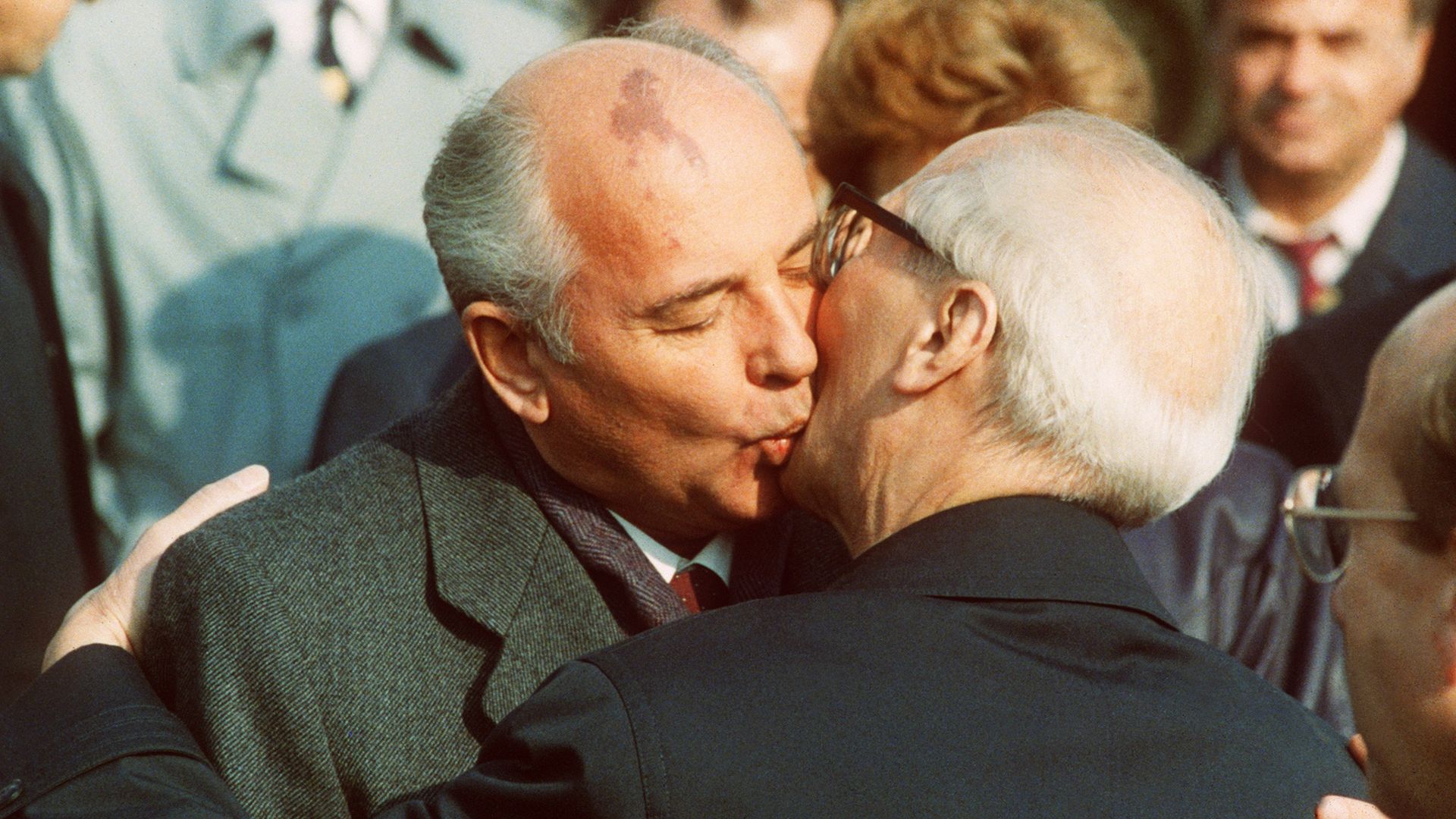

Unanimously elected as party general secretary in 1985 when aged just 54, he was the first relatively young and vigorous leader of a system ruled for decades by elderly men. Although his elevation was regarded with initial suspicion in Washington and other western capitals, it signalled the start of a “second Russian Revolution” that proved unstoppable.
1985年,年僅54歲的他被全票選舉爲蘇共總書記,在這個由老年人統治了幾十年的體制中,他是第一位相對年輕且充滿活力的領導人。儘管華盛頓和其他西方政府最初對戈巴契夫的提拔心存疑慮,但這標誌着「第二次俄羅斯革命」的開始,事實證明這是勢不可擋的。
Gorbachev embarked on what he called perestroika — restructuring. The slogan was chosen to sound unthreatening. The intention was to reform the communist system, to make it more efficient and humane. But given the stagnation throughout the economy and society, he knew it would require radical change.
戈巴契夫開始了他所謂的「改革」——重組。選擇這個口號是爲了聽起來不具威脅性。其目的是改革共產主義制度,使其更加高效和人性化。但鑑於整個經濟和社會的停滯不前,他知道這需要徹底的變革。
On the eve of his election as party leader, he told his wife Raisa: “We can’t go on living like this.” Yet as each attempt to revitalise the economy was thwarted by an entrenched and corrupt bureaucracy, he switched to ever more fundamental political transformation that came to threaten the leading role of the Communist party itself.
在當選爲黨的領導人前夕,他對妻子賴莎說:「我們不能再這樣生活下去了。」然而,由於每次振興經濟的嘗試都被根深蒂固的腐敗官僚機構所挫敗,他轉而進行更加根本性的政治變革,這對共產黨自身的領導地位構成了威脅。
Gorbachev’s greatest successes were on the world stage, where he overcame deep mutual suspicion and forged close ties with Ronald Reagan, then US president, and his successor George HW Bush. After a 1984 meeting with Margaret Thatcher, she famously concluded: “I like Mr Gorbachev. I think we can do business together.”
戈巴契夫最大的成就是在世界舞臺上,他克服了深深的相互猜疑,與時任美國總統隆納•里根(Ronald Reagan)及其繼任者老布希(George HW Bush)建立了密切的關係。1984年與瑪格麗特•撒切爾(Margaret Thatcher)會晤後,她得出了一個著名的結論:「我喜歡戈巴契夫先生。我想我們可以一起合作。」
In the west, his easy smile, intelligence and charm inspired “Gorbymania” from the crowds who mobbed him on his travels with the glamorous and intelligent Raisa in the 1980s. In Germany he was most popular of all, thanks to his role in backing unification after the fall of the Berlin Wall.
在西方,他輕鬆的微笑、智慧和魅力激發了「戈巴契夫狂熱」(Gorbymania)。上世紀80年代,當他和魅力四射、聰明伶俐的賴莎(Raisa)一起旅行時,人們簇擁著他。在德國,他是最受歡迎的,這要歸功於他在柏林牆倒塌後支援統一的角色。
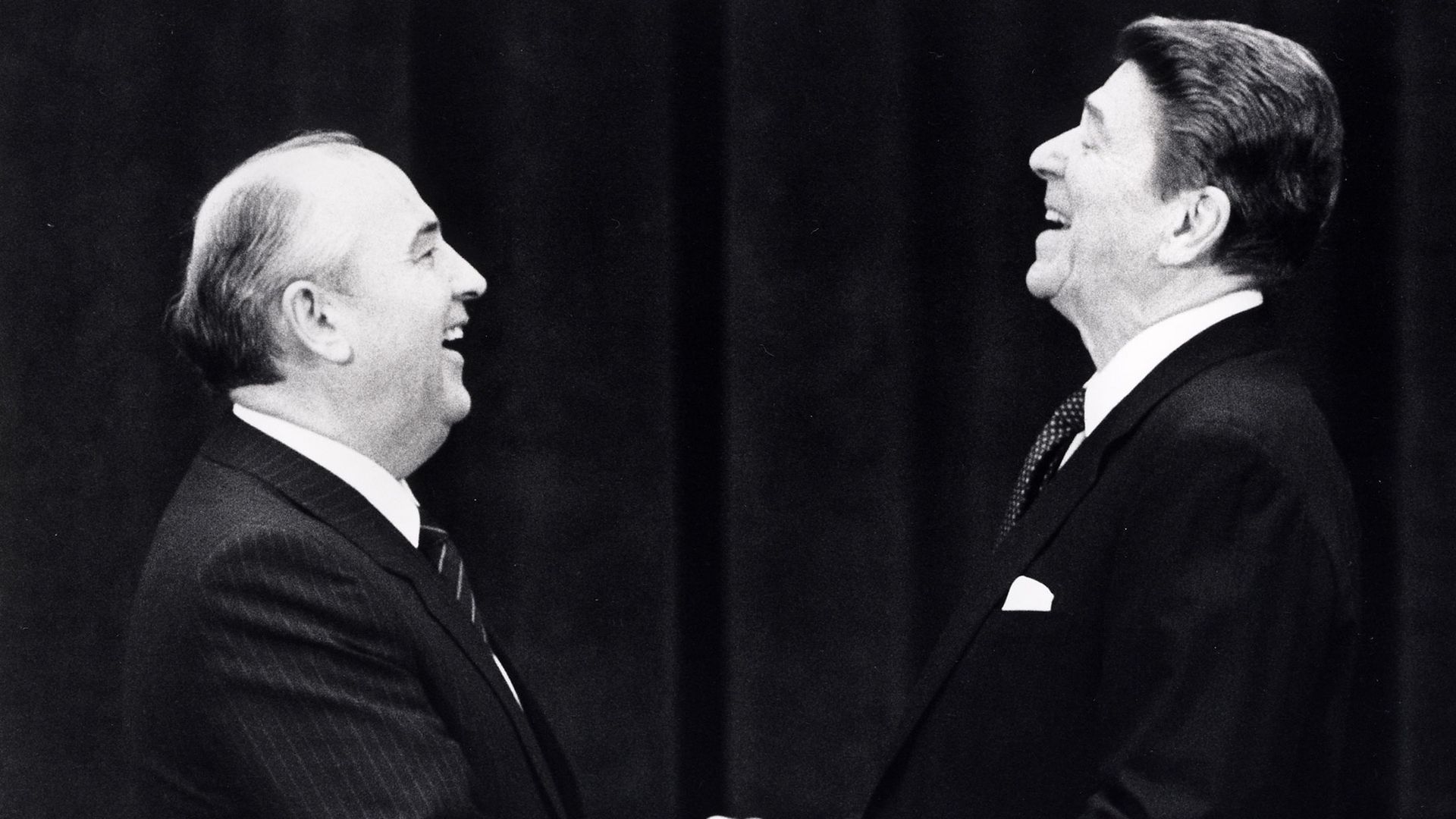

His “new thinking” was instrumental in ending the ideological confrontation between east and west. Seeing a direct link between ruinous military expenditure and the sorry state of the Soviet economy, he set out to end the global arms race. He promoted the idea of a nuclear weapons-free world by 2000 and pulled Soviet troops out of their disastrous intervention in Afghanistan.
他的「新思維」在結束東西方之間的意識形態對抗方面發揮了作用。看到破壞性的軍事開支和蘇聯經濟的糟糕狀況之間的直接聯繫,他開始著手結束全球軍備競賽。他倡導在2000年之前建立一個無核武器世界的理念,並將蘇聯軍隊從其對阿富汗的災難性干預中撤出。
In the USSR, however, his perestroika unleashed forces he could not control. His initial popularity, boosted by televised walkabouts and frank public debates, faded as his reforms failed to transform the domestic economy and improve ordinary lives. Perestroika sought to promote private initiative without dismantling the ossified state planning system or allowing a real market economy. The result was a collapse in state-controlled production and chaos in the distribution of goods.
然而,在蘇聯,他的改革釋放了他無法控制的力量。他最初的受歡迎程度是透過電視轉播的罷工和坦率的公衆辯論而提高的,但隨著他的改革未能轉變國內經濟並改善普通民衆的生活,他的支援率逐漸下降。改革尋求在不廢除僵化的國家計劃體制或允許真正的市場經濟的情況下促進私人的主動性。其結果是國家控制的生產的崩潰和商品分配的混亂。
Glasnost, or transparency, the other pillar of his transformation process, also had unintended consequences. It was supposed to be a carefully orchestrated opening of the media to expose the sins of the past and outmanoeuvre opponents of reform. By removing draconian restrictions on information, however, it resulted in a diversity of opinion and public debate that exposed the entire power structure to devastating criticism.
作爲他轉型過程的另一個支柱,公開性(Glasnost)或透明度(transparency)也產生了意想不到的後果。這應該是一場精心策劃的媒體開放,以揭露過去的罪惡,並在策略上戰勝改革的反對者。然而,透過取消對資訊的嚴格限制,它導致了意見的多樣化和公衆辯論,使整個權力結構暴露在毀滅性的批評之下。
When he arranged in 1986 — behind the backs of the KGB secret police — to end the exile of Andrei Sakharov, father of the Soviet nuclear bomb, he liberated a man who rapidly became the moral conscience of the country. The most famous Soviet dissident wanted genuine democracy and an end to the “leading role” of the Communist party. In 1989, at the Congress of People’s Deputies, a grudging Gorbachev gave him the platform to say so. The nation stopped work to watch them argue on live TV and, from that moment, the revolution was unstoppable.
1986年,當他揹着克格勃祕密警察安排結束蘇聯核彈之父安德烈•薩哈羅夫(Andrei Sakharov)的流亡時,他解放了一個迅速成爲這個國家道德良知的人。這位最著名的蘇聯持不同政見者想要真正的民主和結束共產黨的「領導地位」。1989年,在人民代表大會上,不情願的戈巴契夫給了他這樣說的平臺。整個國家停止工作,觀看他們在電視直播中爭論,從那一刻起,革命就勢不可擋了。
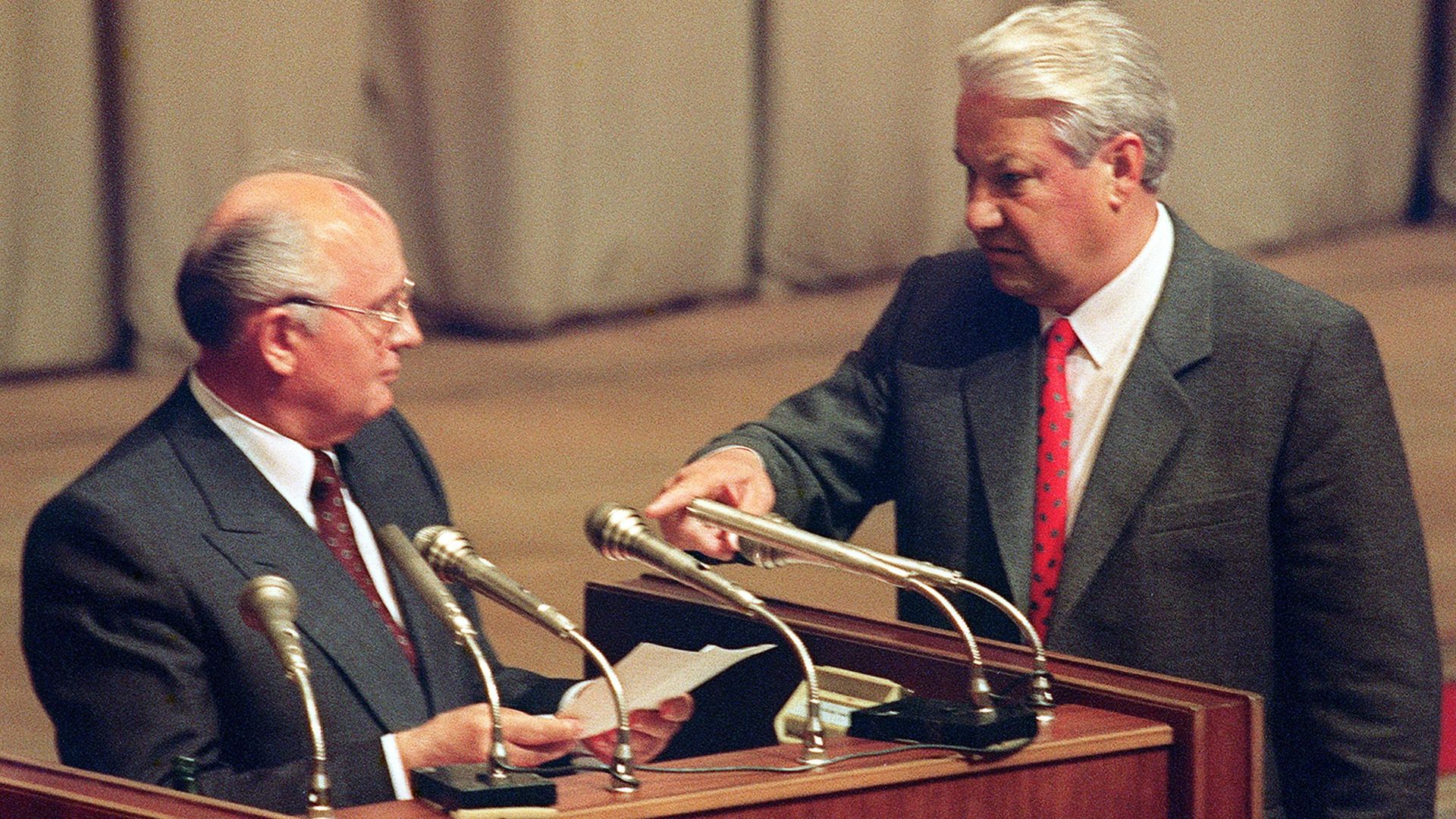

One of Gorbachev’s greatest failures, however, was in not dismantling, or at least emasculating, the KGB itself. At first he relied on the security service to drive the reform process, but in the end it became the leading force of reactionary opposition and led the coup attempt in 1991 that sought to overthrow him. Although the coup failed, the president’s inability to revive the moribund economy and contain an upsurge of nationalist revolts that spread from the Baltic republics to the Caucasus was what eventually destroyed the Soviet Union.
然而,戈巴契夫最大的失敗之一是沒有解散克格勃,或者至少對其進行閹割。起初,他依靠安全部門來推動改革進程,但最終,安全部門成爲反動反對派的主導力量,並在1991年領導了企圖推翻他的政變。雖然政變失敗了,但由於總統沒能重振停滯不前的經濟,也沒能遏制從波羅的海共和國蔓延到高加索地區的民族主義叛亂,最終摧毀了蘇聯。
What started as demonstrations for devolution to outlying parts of the empire became outright independence movements, spreading in turn to Russia itself. Gorbachev never understood why there was so much resentment of Soviet rule but his democratic instinct meant he was not ready to suppress it. Without a ruthless tsar in the Kremlin, the centre could not hold.
一開始的示威遊行要求將權力下放到帝國的外圍地區,後來變成了徹底的獨立運動,進而蔓延到俄羅斯本身。戈巴契夫一直不明白爲什麼人們對蘇聯統治有如此多的怨恨,但他的民主本能意味著他還沒有準備好鎮壓。如果克里姆林宮裏沒有一個冷酷無情的沙皇,那麼這個中心就無法維持。
He also refused to intervene militarily to stop the overthrow of communist regimes in eastern Europe, espousing what Gennady Gerasimov, his spokesperson, famously described as the “Sinatra doctrine — they’ll do it their way”. He even gave his blessing to German reunification in 1990 against strong opposition from the security services. It was a sign of weakness for which the KGB, the military establishment, and communist loyalists never forgave him.
他還拒絕進行軍事幹預,以阻止東歐共產主義政權被推翻,而是信奉其發言人根納季•格拉西莫夫(Gennady Gerasimov)著名的「辛納屈主義——他們會按自己的方式行事」。1990年,他甚至不顧安全部門的強烈反對,爲德國統一送上了祝福。這是一種軟弱的表現,克格勃、軍事機構和共產黨的忠實信徒永遠不會原諒他。


That was the year when Gorbachev was awarded the Nobel Prize for his “leading role in the peace process”. But already his authority in Moscow was fading fast. As the economy collapsed and demonstrators demanded independence on the streets of Tallinn, Vilnius and Tbilisi, he swung back to the conservatives in his party, attempting to reimpose Soviet authority. It was too late. The centre of power was moving inexorably to the Russian presidency by then held by his great rival, Boris Yeltsin.
那一年,戈巴契夫因「在和平進程中發揮的主導作用」而被授予諾貝爾獎。但他在莫斯科的權威已經迅速衰落。隨著經濟崩潰,示威者在塔林、維爾紐斯和第比利斯的街頭要求獨立,他轉而支援黨內的保守派,試圖重新樹立蘇聯的權威。但爲時已晚。權力中心不可阻擋地向他的勁敵鮑里斯•葉利欽的總統寶座轉移。
The abortive three-day coup in August 1991 merely accelerated the process of disintegration. Gorbachev, briefly placed under house arrest in his holiday villa in Crimea, never recovered his full authority. The Communist party was banned and Yeltsin emerged as hero of the hour. The Soviet Union ceased to exist on December 25 and its last leader was bundled ignominiously into retirement.
1991年8月那場爲期三天的未遂政變只是加速瞭解體的進程。被短暫軟禁在克里米亞度假別墅裏的戈巴契夫,再也沒有恢復其全部權力。共產黨被取締,葉利欽成爲當時的英雄。蘇聯於12月25日不復存在,其最後一任領導人也不光彩地被迫退休。
Controversy over that imperial disintegration persists to this day. President Vladimir Putin, a former KGB colonel, is driven by the belief that the collapse of the Soviet Union was “the biggest geostrategic tragedy of the last century”.
關於帝國解體的爭論一直持續到今天。前克格勃上校、俄羅斯現任總統弗拉基米爾•普丁(Vladimir Putin)認爲,蘇聯解體是「上世紀最大的地緣戰略悲劇」。
Mikhail Sergeyevich Gorbachev was born on March 2 1931 into a peasant family in the village of Privolnoye, in the rolling wheat lands and sheep farms of the Stavropol region in southern Russia. His experience as a child under German occupation was important. “Our generation is the generation of wartime children. It has burned us, leaving its mark both on our characters and on our view of the world,” he wrote in his memoirs.
1931年3月2日,米哈伊爾•謝爾蓋耶維奇•戈巴契夫出生在俄羅斯南部斯塔夫羅波爾地區普里沃爾諾耶村的一個農民家庭,那裏有連綿不斷的麥田和羊場。他作爲德國佔領下的兒童的經歷是很重要的。他在回憶錄中寫道:「我們這一代是戰時兒童的一代。它灼傷了我們,在我們的性格和對世界的看法上都留下了痕跡。」
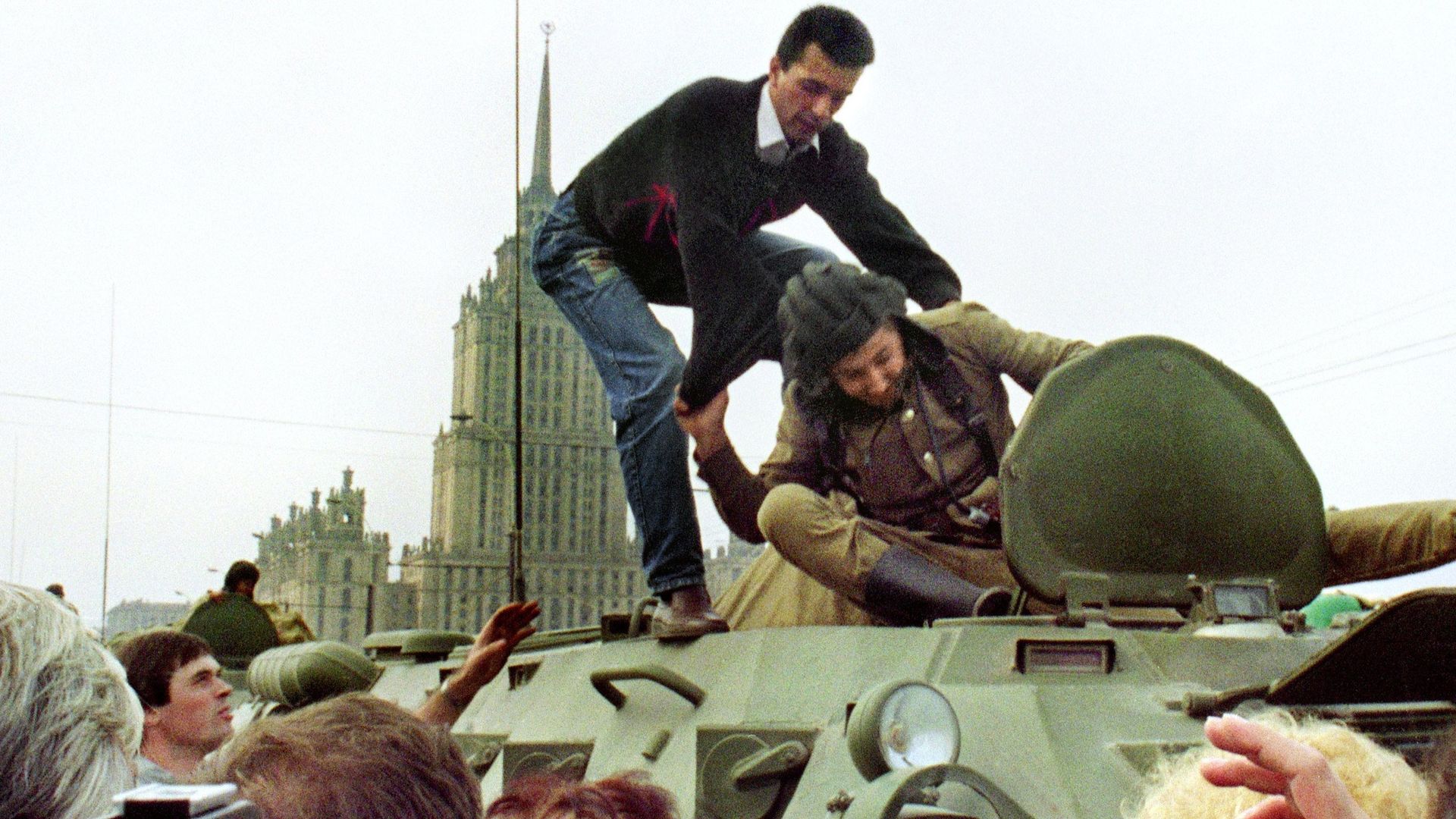

He never forgot the experience of stumbling across the rotting corpses of Red Army soldiers under the snow. “There they lay in the thick mud of the trenches and craters, unburied, staring at us out of black, gaping eye sockets.” It made him acutely aware of the futility of war and suspicious of the power of the military establishment.
他永遠不會忘記在雪下偶然發現腐爛的紅軍士兵屍體的經歷。「他們躺在戰壕和彈坑的厚厚的泥土裏,沒有被掩埋,黑色空洞的眼窩盯著我們。」這使他敏銳地意識到戰爭的徒勞,並懷疑軍事機構的權力。
Thanks to his family history, the future party leader was also conscious of the cruel and arbitrary treatment of dissent under Stalin. Both his grandfathers suffered persecution in the 1930s: one was exiled to Siberia, the other was imprisoned and interrogated by Stalin’s brutal NKVD security police, forerunners of the KGB, as a suspected Trotskyite.
由於他的家族史,這位未來的黨領袖也意識到斯大林時期對異議者的殘酷和武斷的對待。他的祖父和外祖父都在20世紀30年代遭受了迫害:一位被流放到西伯利亞,另一位被斯大林殘暴的內務人民委員會(NKVD)安全警察(克格勃的前身)關押和審訊,被懷疑是託派分子。
He still managed to be top of his class in school and went on to Moscow State University to study law in 1950. Later he admitted that he and his fellow students were subjected to “massive ideological brainwashing”. But he read voraciously, declaring that “the first authors who sowed the seeds of doubt” in his mind about the communist system were Marx, Engels and Lenin.
在學校,他仍然是班裏的尖子生,並於1950年前往莫斯科國立大學學習法律。後來他承認,他和他的同學們受到了「大規模意識形態洗腦」。但他如飢如渴地閱讀,宣稱「在他心中對共產主義制度播下懷疑種子的第一批作者」是馬克思、恩格斯和列寧。
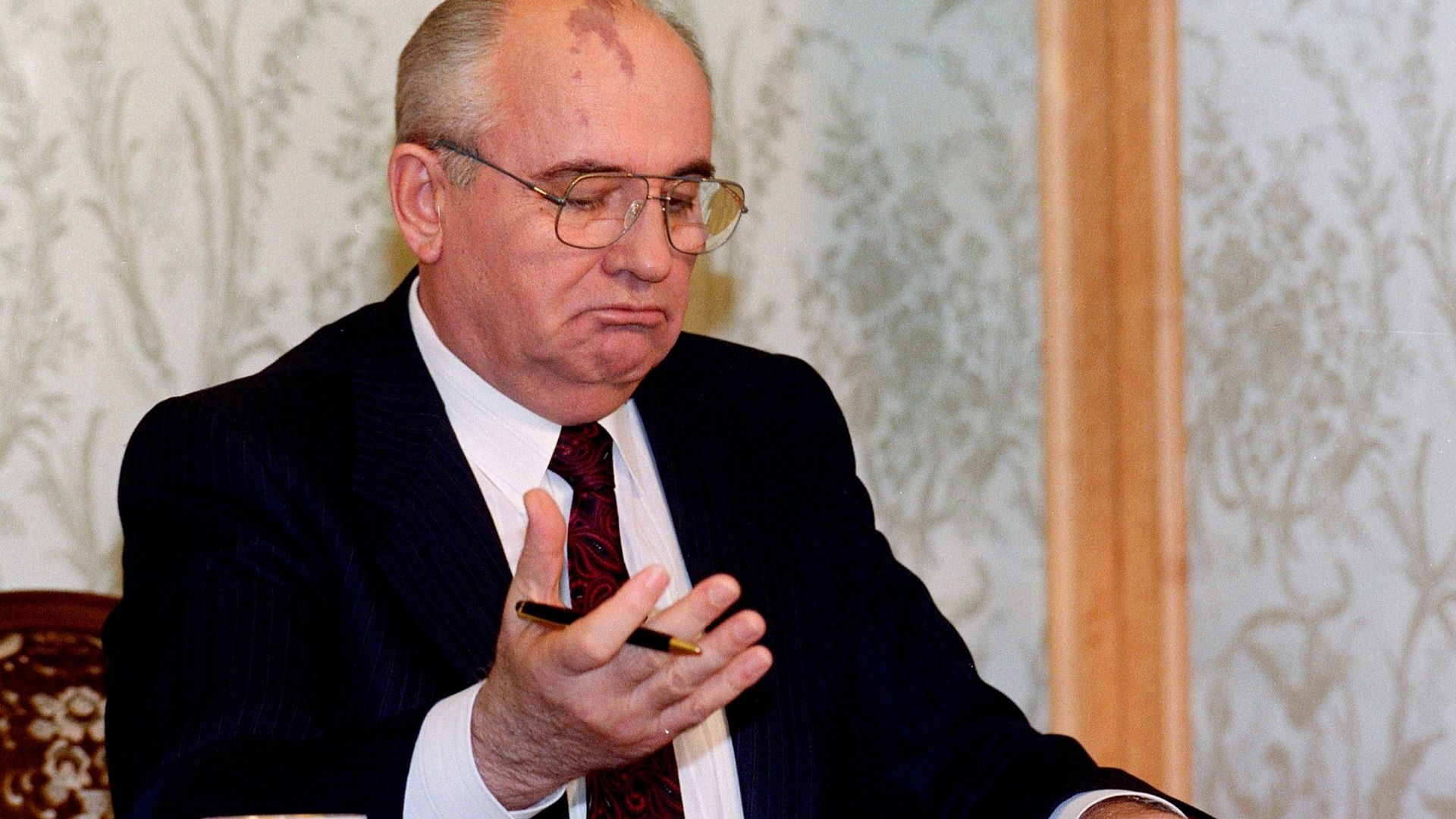

Energetic, persuasive and a good listener, Gorbachev owed his swift promotion to Yuri Andropov, head of the KGB, who became his most important patron. Andropov saw his protégé as a loyal communist who would rejuvenate the leadership and clean up the system. When still under 40, he became party leader in Stavropol and in 1978 was summoned to Moscow; made agriculture secretary in the central committee, he was promoted to the Politburo two years later.
戈巴契夫精力充沛,善於說服別人,善於傾聽,他的迅速晉升要歸功於克格勃首腦尤里•安德羅波夫(Yuri Andropov),後者是他最重要的贊助人。安德羅波夫將自己的門徒視爲一個忠誠的共產主義者,將重振領導層,清理體制。不到40歲時,他成爲斯塔夫羅波爾的黨魁,並於1978年被召至莫斯科,進入中央委員會農業祕書處,兩年後進入中央政治局。
When Andropov succeeded Leonid Brezhnev as party leader in 1982 he appeared to be grooming Gorbachev as his successor. But he died and his protégé’s path to the leadership was blocked by Konstantin Chernenko, a Brezhnev loyalist determined to reverse the reform process.
當安德羅波夫1982年接替列奧尼德•勃列日涅夫成爲黨的領導人時,他似乎在培養戈巴契夫成爲他的繼任者。但他去世後,其門徒通往領導層的道路被康斯坦丁·契爾年科(Konstantin Chernenko)阻斷了。契爾年科是勃列日涅夫的忠實擁護者,決心逆轉改革進程。
In the meantime, Gorbachev had met by chance the man who became his most important intellectual inspiration for reform: Alexander Yakovlev, a former head of the party’s ideology department.
與此同時,戈巴契夫偶然遇到了一個人,這個人成爲他最重要的改革思想靈感來源:亞歷山大·雅科夫列夫(Alexander Yakovlev),黨的意識形態部的前部長。
They met in 1983 when Gorbachev was on an official visit to Canada to inspect farm facilities. Stranded for hours while awaiting the arrival of Ottawa’s farm minister, they took a “walk that changed the world” and discovered that they shared almost identical ideas. Three weeks later, Gorbachev persuaded Andropov to bring Yakovlev, the Soviet ambassador to Canada, back to Moscow.
他們在1983年相遇,當時戈巴契夫正在對加拿大進行正式訪問,視察農場設施。在等待渥太華農業部長到來的幾個小時裏,他們進行了一次「改變世界的散步」,發現他們的想法幾乎完全相同。三週後,戈巴契夫說服安德羅波夫把蘇聯駐加拿大大使雅科夫列夫調回莫斯科。
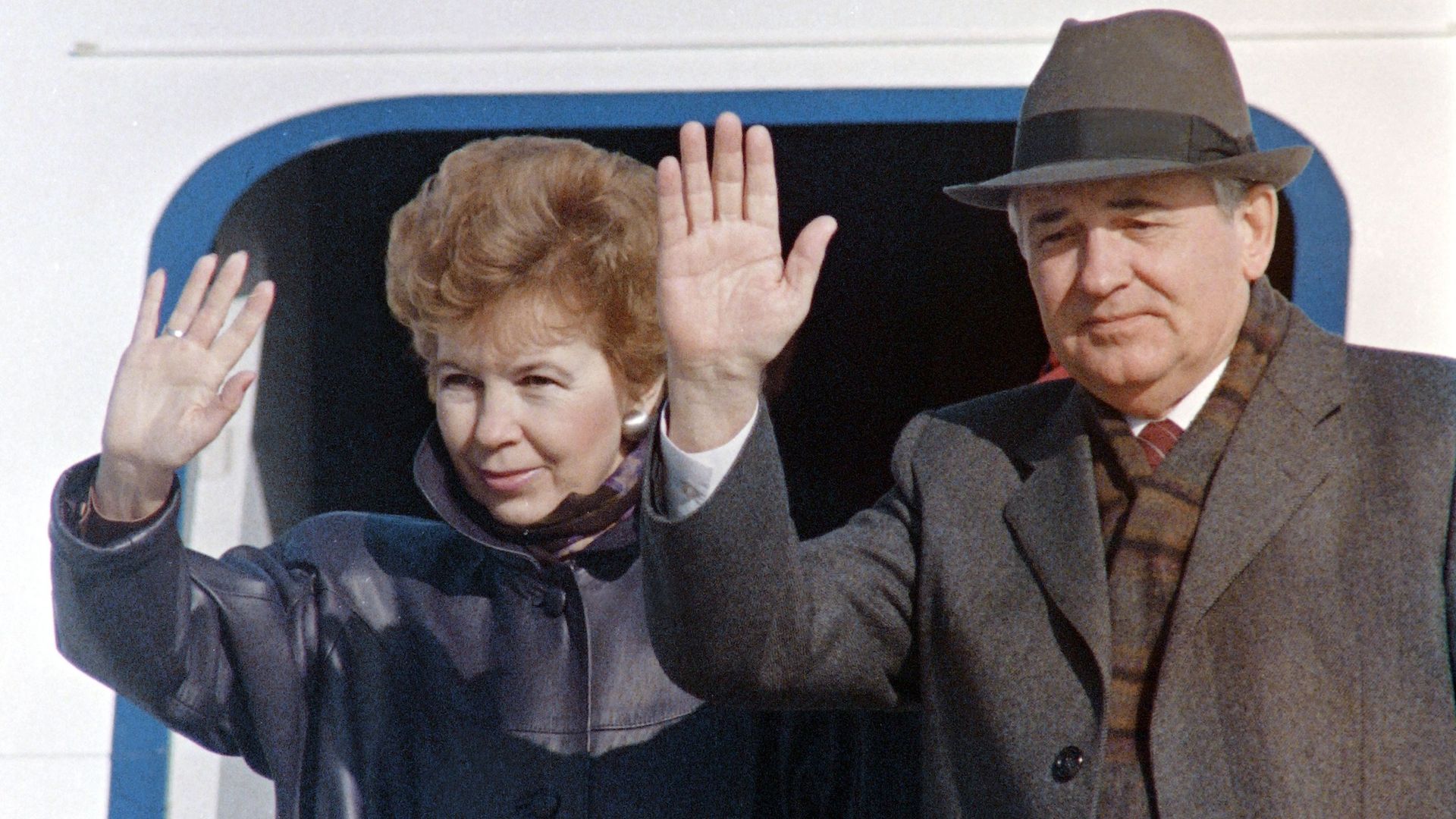

His other key ally was Eduard Shevardnadze, former party leader in Georgia, who became his inspired choice as foreign minister in 1985 — his trusted envoy throughout the process of detente and confidence-building that ended the cold war.
他的另一個重要盟友是喬治亞前黨領袖謝瓦爾德納澤。1985年,謝瓦爾德納澤成爲他鼓舞人心的外交部長人選。在結束冷戰的緩和和建立信任的整個過程中,謝瓦爾德納澤一直是他信任的使者。
It was Yeltsin’s instinct to back the opposition that proved the most prescient and it was Gorbachev’s hesitation to break from his party that destroyed him. Its banning after the 1991 coup removed Gorbachev’s power base. He never forgave Yeltsin for his disloyalty.
事實證明,葉利欽支援反對派的本能是最有先見之明的,而戈巴契夫對脫離其政黨的猶豫不決毀了他。1991年政變後,該黨被取締,戈巴契夫的權力基礎被清除。他從未原諒過葉利欽的不忠行爲。
The death of Raisa in 1996 then left Gorbachev devastated. Asked once what he discussed with his wife, he had replied with one word: “Everything.”
1996年賴莎的去世讓戈巴契夫一蹶不振。有一次被問及他與妻子討論什麼,他只回答了一個詞:「一切」。